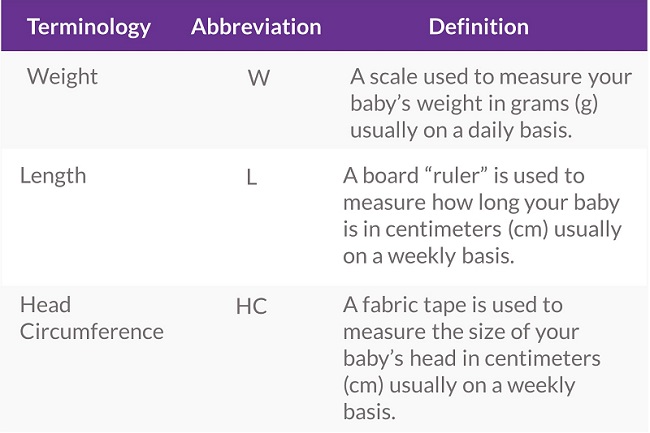Welcome to the NICUtrition® Parent Portal
If you are here, you might be a new NICU parent or anticipating a stay in the NICU. With that can come fear and concern, but we are here to help relieve some of the anxiety you may have, especially as it relates to your baby’s growth and development. Explore this portal to learn about the nutritional needs of your baby, how your baby will be fed during the NICU stay, and what is important for your baby to grow and thrive.
What is the goal of my preterm baby’s growth?
The most critical time of growth and development for babies happens in the last couple of months of pregnancy. For babies born too soon, this growth takes place in the neonatal intensive care unit. The goal for your baby is to grow and develop at the same rate as she would have inside mom. Feeding and nutrition play an important role in this growth.

Why is nutrition important?
Preterm infants have greater nutritional needs during their stay in the NICU than at any other time of their lives. Your baby needs to grow fast during this critical period in the NICU – not only weight gain but brain growth as well. This requires special needs for energy, protein, minerals, and vitamins. Preterm infants who meet their feeding goals and get proper nutrition, go home sooner, have good brain development, and better overall health throughout their life.
What is nutrition?
Breastmilk, donor milk, formula, fortifiers, oh my! Nutrition can come from mom’s own breastmilk, donor milk, and/or preterm infant formula. If your baby is getting breastmilk, she may also receive a fortifier such as extra protein and calcium. This is added to your breastmilk to give more calories to help your baby gain weight and grow. This comes as a surprise to many moms, but don’t be alarmed! There is nothing wrong with your milk. As we said, preterm babies have special needs that full term babies don’t have.
How will my baby be fed?
One of the many things that can be scary is seeing your baby with lots of tubes. When it comes to feeding, preterm infants do not have the ability to suck, swallow and breathe at the same time which they need for breastfeeding or taking a bottle. Right after birth, your baby will receive Parenteral Nutrition (sometimes referred to as PN or TPN – total PN) which will be given via IV (intravenously, through the veins). As soon as possible, your baby will begin to receive Enteral Nutrition (EN) which may be breastmilk or formula delivered to the tummy via a tube. The tube will either go through the nose (NG tube) or through the mouth (OG tube). Fortunately, these are safe and effective options that get your baby everything she needs to thrive… until she learns how to feed on her own.
Because preterm infants have tiny tummies, they need to be fed very small amounts many times per day. You may hear your nurses say your baby is on a Q3 schedule. This means your baby will be fed every 3 hours – meaning 8 times every day. This schedule could change to Q2 (feeding every 2 hours) or Q4 (feeding every 4 hours) depending on your baby’s needs. Alternatively, your baby may be on a continuous feed which is delivered via a pump that supplies a constant rate of nutrition.
How do I know if my baby is on track?
Now that you know what, when and how your baby is fed during their NICU stay, let’s talk about how we measure if what is being done is working.
The nurse will measure your baby — weight, length, and head circumference are common measurements taken on a periodic basis and the results are plotted on growth charts, which are used to track how a baby should grow over time. How your baby tracks will inform how the doctor may change the feeding plan.

Who can I talk to?
In addition to the doctors and nurses who spend a lot of time with you and your baby, other members of the care team can offer help and answer questions for you. Your NICU may have a Registered Dietitian (RD), Lactation Consultant, Social Worker, or a Parent Group that are there to help you feel better and make your stay in the NICU as comfortable as possible.


